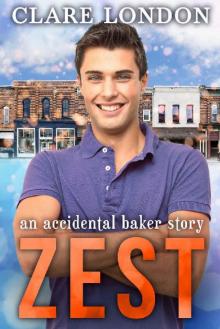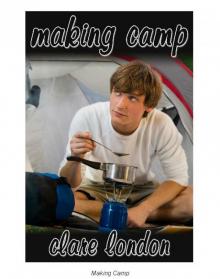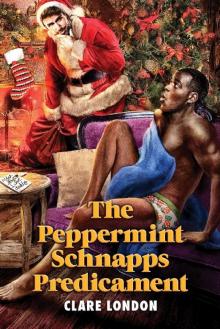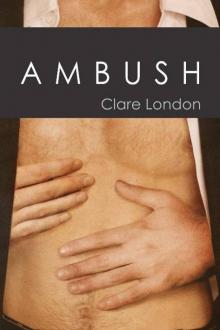- Home
- Clare London
Peepshow
Peepshow Read online
Peepshow
By Clare London
A London Lads Story
Ever wanted to spy secretly on other people’s lives?
Ken doesn’t have a choice: his student summer job is manning the CCTV screens for the new central London shopping mall. But instead of spotting criminals or vandals, he becomes fascinated by a cute waiter from the local bistro who sneaks out to the backyard for his break—and plays sexy to the camera.
Is he an old friend, or just an anonymous exhibitionist? Should Ken be excited by this naughty peepshow, or will people think he’s a voyeuristic pervert? Poor Ken’s confused and thrilled in turn. It’s like living in one of the movies he’s studying at university. He knows the man can’t see him, yet Ken feels a connection of some kind. It all encourages Ken to continue with his guilt-ridden Waiter Watch.
Ken bears the suspense as long as he can, until a chance meeting and an abortive blind date provide the explanation to the secret assignations. But will this guide Ken to a real-life chance of romance?
Table of Contents
Blurb
Text
Exclusive Excerpt
More from Clare London
About the Author
By Clare London
Visit Dreamspinner Press
Copyright
KEN HAD to admit he hated his job. With a passion. Or rather, with a slow-burning boredom and distaste. Passion implied some kind of energy—the agony and the ecstasy!—and Ken had none of that left after another night sitting in the small, stuffy room and gazing at a wall of screens.
He leaned back in his hard-backed chair, stretched, and yawned. A glance at the clock confirmed it was a good hour until his official break time, when the steroid-enhanced Tomas would reluctantly pause in strutting his security patrol around the shopping centre, and arrive to cover Ken’s post while he went for coffee and a sandwich. Then another two hours until the end of the shift at 2:00 a.m., when old Charlie would shuffle in for duty, complete with his tatty Aran cardigan, his Maeve Binchy paperback, and an oversized thermos of homemade vegetable soup, to take over from Ken until the offices opened.
Ken sighed. What a way to spend a Saturday night—or any night, for that matter.
Over three hours to go.
Over three hours….
He yawned again. The screens flickered and settled into a range of views from another angle. There was a bank of them, covering critical points around the shopping centre, and they were manned 24/7. Ken was one of those “manning” people. He was meant to watch the screens closely at all times. The centre was a small one, in Surbiton on the outskirts of London, and couldn’t compete with the massive retail complexes built off the M25 in Essex or central London’s Oxford Street. It was really just a dozen shops hanging out together under the same roof. But these were high-fashion, prestigious-designer stores, full of valuable goods and constantly at threat from thieves, vandals, and general abusers. Or so Ken’s summer-job employers, Safeguard Assured, would have people believe.
Ken thought it wouldn’t be so bad if he actually saw something. Look out, it’s beHIND you! He knew it was ludicrous to wish for theft, destruction, or general abuse—whatever that covered—but he’d been working here for over a month now, and he’d seen nothing untoward. Nothing at all. No fights, no malicious damage to the shops or the building, no tanks ramming through the night-time shutters, no intercontinental ballistic missiles shrieking in from the dark night skies above—only twenty-four hours left to protect historic London!—to destroy everything the population held dear….
Okay, so his mind was rambling again. His mum always said he had a vivid imagination. He’d chosen well when he took a media and film studies course at Kingston University, because he’d always spent far too much time imagining book and movie quotes around real-life events. Of course, Mum’s respect wasn’t always matched by the rest of the family—Dad said Ken lived in a fantasy world, and his teenage brother, Joe, said he was just a sad bloke. Ken sighed again. He knew he was pretty safe here in the control room—except, of course, from the intercontinental ballistic missile scenario—because he wasn’t expected to leap into personal action if he saw any crime taking place. There’d never been any training session for that, just a brief run-through of the screens and the logging in and out procedures, and a schedule of the night-time shifts. He’d been given a list of contact numbers if he needed help. From the way his boss had wrinkled his nose at that, Ken knew it wouldn’t be welcome if he called up his boss at a quarter to midnight to ask where the milk was for his tea. I’m sorry, caller, there’s no record of that number…. No, the contact numbers were for the duty security guards like Tomas, and also an emergency number to the local police station. That was if something went seriously wrong.
Which it never did.
No, of course he wasn’t inviting that missile again. But Ken hadn’t seen any action so far except people coming and going at the takeaways and late-night restaurants, which stayed open until the early hours of the morning. He swung aimlessly back and forth on his chair and opened another packet of cheesy snacks. He could feel the coating sticking to his teeth, but at least chewing it off helped to keep him awake. The Lord of the Rings paperback—three books in one, special offer!—had been last week’s additional incentive, but the boxed set of assorted crime thrillers he’d borrowed from Mum this week—murder, intrigue, and suspense from some of Britain’s finest!—hadn’t worked as effectively. Screen-watchers weren’t meant to spend their time with their head in a book—how would they see the incoming missile?—but it was about the only way to keep the boredom at bay.
“You should knit,” his mate Simon had suggested. Simon knitted, but not lumpy long scarves or hideously misshapen Christmas gloves like Ken’s gran. Si created cool beanie hats and cotton gilets and wonderful album cover designs on sweaters. He was studying textile design at the same university, with fellow students far more arty than Ken’s peers, judging by their clothing and the bold interior design of their rooms. Ken had tried knitting a hat once—you shouldn’t knock it until you’ve tried it, right?—and Mum was still using it as a tea cosy. She said the gaps down the side gave the steam somewhere to go. Ken hadn’t battled with knitting needles again—he was happier with a storyboard. Yet where had his first year of film studies taken him? Watching rain fall on the concrete pavement outside a shopping centre for hours at a time. There was irony there, somewhere.
He’d tried plenty of things to help pass the time. He played solitaire until he found himself almost homicidal when a three of clubs refused to reveal itself. The book of crosswords had been abandoned at page nine, after he’d expressed his frustration by inserting every obscene word he could think of, whether they fit the grid or not. And his songwriting attempts had never got any further than I woke up this morning before he started salivating for bacon sandwiches and brown sauce. He’d tried sketching out a storyboard for a film project of his own but, unfortunately, Charlie had caught sight of it one night, and now he kept suggesting Ken should remake a couple of Maeve Binchy’s classic stories. Charlie even suggested casting and the songs for the soundtrack. Much as he liked the old codger, Ken now found it less teeth-grinding to keep that work for the privacy of his own room. So he was back to nothing but the screens for distraction.
There was a small yard at the back of one of the restaurants where the waiters came out to smoke. It was plumb in the middle of Ken’s central screen. This one was a French bistro, which meant the prices were too high for his student pocket. Spare a coin for a sandwich, sir? He didn’t have sound as well as a view, but he watched the way the waiting staff nodded to each other, laughed, shared matches for the ciggies. There wasn’t much space to move around in the yard, because the wall between the restaurant an
d the next-door dry cleaners was covered almost entirely with huge, shoulder-high recycling and waste bins. The waiters leaned against the bins or scuffed their shoes on them. Sometimes the chef opened the door from the restaurant and yelled at them to get their arses back to work. Well, Ken couldn’t actually hear the words, but the chef’s face looked flushed and impatient—even in grainy black-and-white—and Ken’s imagination supplied the language. Although the waiters rolled their eyes and mimicked his gestures as soon as he turned his back, they usually stubbed out the cigarettes quickly and shuffled back indoors.
Sometimes Ken saw them leaving at the end of their shift from a gate at the farthest point of the yard. It was a shortcut back to the housing estate across the ring road. He had to imagine the gate, because it was out of view of the camera, but the waiters would tumble out of the back door with their coats on and backpacks slung over their shoulders, waving and joking with the new shift who were taking over. The place did breakfasts too. Didn’t it ever close?
He’d noticed a group of friends who seemed to work and travel everywhere together—a cluster of students like him, presumably, all dressed in similar hoodies and jeans; two men who were obviously a romantic couple; a mother and daughter who still had a smile for each other after a long night in the kitchen.
Ken grimaced. So it had come to this—he was getting familiar with the monochrome faces of people he’d never meet in real life, probably didn’t want to meet, and who probably wouldn’t want to meet him. He didn’t think of them as friends, did he? That’s what his other good mate Robbie said when Ken shared some of his stories at the pub. “You’re not mates with these people, Kenny. That’d be bloody weird.” Everyone around the table agreed with Robbie. In fact, Ken laughed and agreed too.
Because that’s not how it was. He preferred to consider the people caught on CCTV as his own private soap opera. Previously, on the Surbiton Spectrum Shopping Centre Security Channel…. The waiters at the restaurant. The foxes that came sniffing around the bins, arrogantly careless of anyone else. The police cars that periodically cruised the front of the centre. The fat man who ran the all-night grocer/newsagents, who took a break every now and then, drained a bottle of cola, and had a thorough scratch of his crotch through trousers shiny with wear. The young couple who stocked up the Moroccan café at weekends and who loitered in the service road behind the shop for a snogging session. The boy would have taken it further; Ken could see his eagerness—and bloody quick hands—but the girl was always looking over her shoulder in case someone caught them.
Yes, even outside shopping hours, there was a lot of activity in and around the centre. It wasn’t really what Ken was employed to watch out for, but he reckoned he could weave it into his film projects; he could let it inspire him. Everyone enjoyed people-watching, didn’t they? And his personal soap opera was benign. It wasn’t full of cliché gun battles or car chases. Only sometimes did he feel like a voyeur, but without the sexiness.
A waiter ambled out of the French bistro, and Ken’s attention darted back to that screen. The young man moved quickly—maybe he only had a few minutes’ break—and made for the far side of the yard. That corner was partially hidden by two of the largest bins and out of reach of the security lights. The only CCTV screen that covered it was one of the oldest and with the poorest picture. Sometimes one of the waiting staff would sneak behind these particular bins, and Ken assumed it was because they didn’t want to be seen, either by CCTV or from inside the restaurant. Was that what this man was doing? He had his back to Ken, hiding what he was up to. Was he smoking? Taking drugs? Ken had seen it on other evenings. Was he meant to report that kind of thing, or just crimes that involved damage to the centre itself? And how hypocritical would he be, when he’d smoked more than a few things in his time?
He peered more closely and wished there was a zoom feature. He didn’t like to touch the controls too much, since the time he’d fiddled with the brightness, messed up screens one to four, and spent three hours looking at static—I’m breaking up! I’m breaking up!—until Charlie arrived. The old man had shrugged at Ken’s apology, turned the control button to its fullest point, thumped somewhere under the desk, and the screens had all popped back into focus. Luckily, of course, the missile hadn’t arrived at that very time, though Ken rather thought there’d be other clues if the building were attacked from space.
The man in the yard turned his head, and Ken caught sight of his shadowed profile. He wasn’t smoking; he was sucking juice from a carton. A new employee? Ken didn’t think he’d noticed him before. Tall, lithe body in tight black trousers and a white shirt that stretched taut over his pecs, short-cropped dark hair, prominent but attractive nose. Ken couldn’t see his eyes because he was looking down at the carton, but the heavy lids were sexy. Even though the picture was blurred, Ken could tell that clearly enough. And the way the man’s lips tightened on the carton straw was…. Be still, my beating heart. Ken laughed at himself a little bitterly. His poor old dick hadn’t hardened that quickly for a long time. He shifted on the seat, trying to get comfortable again. He really needed to get back out in the dating game again. Oh wait, first he had to find the time to date, didn’t he? But if and when he did, this was just the kind of look he’d always liked, ever since school days, however shallow Mum would say it was to judge a book by its cover alone….
And then the guy turned towards the camera so that one side of his face eased out of the shadows—and he winked.
Huh? Ken leaned forwards in his chair, startled, but the moment was gone. The waiter turned on his heel, threw his empty carton into the bin, and sauntered back inside the restaurant.
AT THEIR local pub, the Grove, the following night, Simon returned to his current aid programme for Ken’s love life. “He said you should call him up. I think he’s cute.”
“Who? And what do you mean, cute? My idea of cute or yours?” Ken was trying to catch their mate Robbie’s eye over at the bar. He only wanted a soft drink this time around, but Robbie was notorious for drinking challenges. With resignation, Ken watched Robbie return to the table with a tray of full pints.
“Ollie Robinson,” Simon said, studiously avoiding Ken’s question about their relative taste in men, which had never been remotely similar. “He’s not like he was in school.”
“In school? Our school?”
“You don’t mean Rolly Ollie, do you?” said Robbie. He laughed far too loudly, a testament to the four pints he’d already downed. He didn’t get aggressive or pathetic when drunk, just louder and louder. “He was in my chemistry class. Size of a beer barrel, thick glasses, spots like baked beans, total swot. Geekness on knobbly-kneed legs.”
“Robbie, how come the rest of us have matured but your humour’s stuck in primary school?” Simon wrinkled his nose and frowned. “I met Ollie a couple of weeks ago at the cinema, and he’s keen to catch up with as many school friends as he can find. He’s really interested to discover what they’re doing now, while he’s back from Oxford for the holiday.”
“Doesn’t one say going down from Oxford?” Robbie muttered and leered at Simon. “I recall he couldn’t keep his hands off you in games.”
Simon flushed and shook his head. “You’re such a prick. And the phrase is ‘coming down,’ not going.”
“Works for me either way.” Robbie snickered.
“Ollie may have embraced his sexuality a little earlier than others I could mention—” Simon pointedly ignored Robbie’s glare and continued, “—but he’s looking good on it. Plus, he’s as bright as he always was, seems to be doing okay at Oxford. And he’s very much slimmer than he was at school.” Simon gave a small wince of distress. “Much better skin.”
Robbie snorted and reached for the next pint.
Ken knew Si had been referring to the time it had taken Robbie to find his own epiphany and admit publicly he was gay. It had happened only six months ago, when he had a brief, tempestuous, and athletically sexual affair with Steve, his ex-tutor in science.
Since they broke up, Robbie had been making up for lost time by dating everything and anything with a pulse, with only a few—and very minor—provisos. Not that Simon and Ken hadn’t known for years that Robbie was gay. They’d been the only ones, though. When Si had been wearing pale blue cravats with his school uniform, and Ken had been facing his parents with the slightly startling explanation of why he didn’t have any designs on the next-door neighbour’s daughter, Robbie had been the loudest and most obnoxious bully on the rugby team. They’d all ended up at Kingston University, albeit on different courses, and Si and Ken had just bided their time before Robbie came out. Frankly, my dear, I don’t give a damn. By now their friendship was deep, comfortable, reliable—and, like many groups of young male friends, ruthlessly teasing.
“So. What do you think?” Si asked Ken. “About Oliver?”
“I’m not sure it’s a good thing to dwell on the past,” Ken said. He felt a flush creeping up his neck.
“How come? Our friendship’s stood the test of time, hasn’t it? And that’s been going for yonks.”
“Ken means,” Robbie said, leaning in with his arms around both their shoulders and breathing beer fumes on Ken’s cheek, “that he’s not interested in old school chums, because he’s never got over his crush on Jimmy Evans in the year eleven LGBT club.”
“For God’s sake.” Ken punched Robbie in the arm, not lightly, but Robbie ignored him. “That was years ago. We were only sixteen, too young to know what the hell was going on. If he’d even been interested.” Methinks he doth protest too much.
“You were mad for him,” Robbie continued relentlessly. “Moping everywhere. First lurve, I’d say. Never saw you like that again.”
“Shut up,” Ken protested, though that never usually stopped Robbie.
“He was a good bloke, I’ll say that for Jimmy Evans. One of the lads in rugby and cricket, but decent to the girls. And he looked after his family. Didn’t his dad get ill?” Robbie took another slurp of beer. “Have to ask Ollie, eh, Si? He’s the go-to guy, according to you.”

 Timeslip
Timeslip Just Like in the Movies
Just Like in the Movies The Accidental Baker
The Accidental Baker Santa, Actually
Santa, Actually Branded
Branded Romancing the Rough Diamond
Romancing the Rough Diamond Unwrapping
Unwrapping Zest: an accidental baker story (The Accidental Baker Book 2)
Zest: an accidental baker story (The Accidental Baker Book 2) Romancing the Undercover Millionaire
Romancing the Undercover Millionaire Chase the Ace
Chase the Ace Peepshow
Peepshow Between a Rock and a Hard Place
Between a Rock and a Hard Place Making Camp
Making Camp The Peppermint Schnapps Predicament
The Peppermint Schnapps Predicament Romancing the Ugly Duckling
Romancing the Ugly Duckling His Gift
His Gift True Colors
True Colors One Night Stand
One Night Stand Romancing the Wrong Twin
Romancing the Wrong Twin A Good Neighbour
A Good Neighbour Ambush
Ambush Sweet Summer Sweat
Sweet Summer Sweat